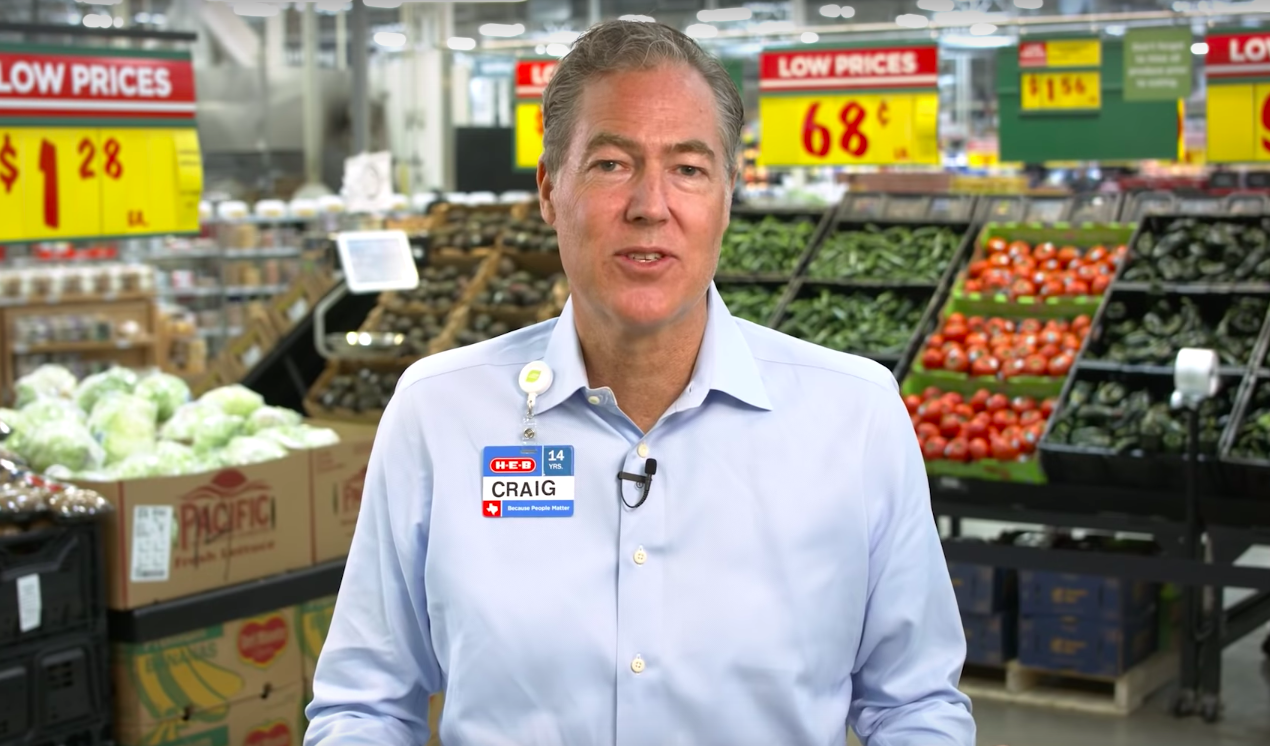The Amazing H-E-B

One of the blessings of living in Texas is the H-E-B supermarket chain, especially its premium Central Markets. But all H-E-B stores are good, and they’re owned by a Texas family. Texas Monthly has a great story about how H-E-B has been preparing for a moment like this since 2005 — and ramped up its preparation earlier this year. If only the federal government had the sense of a Texas supermarket chain! Excerpts:
San Antonio-based H-E-B has been a steady presence amid the crisis. The company began limiting the amounts of certain products customers were able to purchase in early March; extended its sick leave policy and implemented social distancing measures quickly; limited its hours to keep up with the needs of its stockers; added a coronavirus hotline for employees in need of assistance or information; and gave employees a $2 an hour raise on March 16, as those workers, many of whom are interacting with the public daily during this pandemic, began agitating for hazard pay.
This isn’t the first time H-E-B has done a good job of managing a disaster—it played an important role in helping the Gulf Coast recover from Hurricane Harvey in the immediate aftermath of the storm—which led us to ask: How did a regional supermarket chain develop systems that allow it to stay ahead of a crisis as big as this one? We spoke with nearly a dozen employees, executives, and customers to better understand—in their words—how H-E-B has taken on its unique role in shaping its business around the needs of Texans in the midst of trying circumstances.
More:
Justen Noakes, director of emergency preparedness, H-E-B: Just a little bit of history: we have been working on our pandemic and influenza plan for quite a while now, since 2005, when we had the threat of H5N1 overseas in China. That’s when we first developed what our plan looked like, [as well as] some of our requirements and business implications. In 2009, we actually used that plan in response to H1N1, when the swine flu came to fruition in Cibolo, and refined it, made it more of an influenza plan. We’ve continued to revise it, and it’s been a part of our preparedness plan at H-E-B ever since.
Craig Boyan, president, H-E-B: Justen leads our emergency preparedness with a group of folks, and that is a full-time, year-round position. We are constantly in a year-round state of preparedness for different emergencies. We keep emergency supplies at almost every warehouse and have water and other supplies staged and ready to go and kept in storage to make sure that we are ready to [react quickly] when a crisis emerges, whether it be a hurricane or a pandemic. We take being a strong emergency responder in Texas, to take care of Texas communities, very seriously.
On January 15, Wuhan’s Municipal Health Commission announced that the novel coronavirus was spreading via human-to-human transmission.
Justen Noakes: So when did we start looking at the coronavirus? Probably the second week in January, when it started popping up in China as an issue. We’ve got interests in the global sourcing world, and we started getting reports on how it was impacting things in China, so we started watching it closely at that point. We decided to take a harder look at how to implement the plan we developed in 2009 into a tabletop exercise. On February 2, we dusted it off and compared the plan we had versus what we were seeing in China, and started working on step one pretty heavily.
Craig Boyan: Starting in January, we’ve been in close contact with several retailers and suppliers around the world. As this has started to emerge, we’ve been in close contact with retailers in China, starting with what happened in Wuhan in the early couple of months, and what kind of lessons they learned. Over the last couple of months, [we’ve been] in close contact with some of our Italian retailers and suppliers, understanding how things have evolved in Italy and now in Spain, talking to those countries that are ahead of us in the curve. We’ve been in daily contact, understanding the pace and the change and the need for product, and how things have progressed in each of those countries.
Read it all.It’s a fantastic story — very encouraging, and an example of how to behave in crisis. The logistical planning here is just amazing. I’m so grateful to Texas Monthly for bringing us an inspiring story like this.
Anybody have a similar story about a business performing well in this crisis? Please share it.
I’m pleased to share with you this coronavirus clip below from H-E-B’s president. My favorite thing about living in Texas was H-E-B’s Central Market. The original Austin location where my new fiancée and I bought chips, salsa, and Veuve Clicquot to drink the night we got engaged in 1997. The Lovers Lane store in Dallas was my happy place when we lived in that city from 2003 to 2010. Every time I go back to Dallas, I go buy and stock up on hundreds (not kidding!) of CM tortillas, which we freeze and try to make last until one of us gets back to Texas. If you’re a Texan, you’re lucky to have H-E-B. That is some capitalism I can celebrate like Coach Taylor and the Panthers winning the state championship.
Subscribe for as little as $5/mo to start commenting on Rod’s blog.